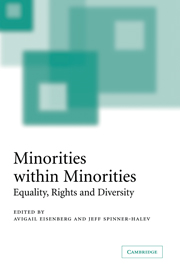Book contents
- Frontmatter
- Contents
- Notes on Contributors
- Acknowledgements
- Introduction
- Part I Toleration
- Part II Equality
- Part III Individual autonomy
- 7 Autonomy, association and pluralism
- 8 Sexual orientation, exit and refuge
- 9 On exit
- 10 Minors within minorities: a problem for liberal multiculturalists
- 11 Beyond exit rights: reframing the debate
- Part IV Self-determination
- Part V Democracy
- References
- Index
10 - Minors within minorities: a problem for liberal multiculturalists
Published online by Cambridge University Press: 22 September 2009
- Frontmatter
- Contents
- Notes on Contributors
- Acknowledgements
- Introduction
- Part I Toleration
- Part II Equality
- Part III Individual autonomy
- 7 Autonomy, association and pluralism
- 8 Sexual orientation, exit and refuge
- 9 On exit
- 10 Minors within minorities: a problem for liberal multiculturalists
- 11 Beyond exit rights: reframing the debate
- Part IV Self-determination
- Part V Democracy
- References
- Index
Summary
Liberal multiculturalists seek to base the extension of group rights and accommodations to ethnocultural minorities on the claim that it is the interests of individuals and not groups themselves that warrant such rights and accommodations. Individual freedom and flourishing, liberal multiculturalists argue, is only possible within a cultural context. Traditional liberal policies of individual rights ought therefore to be supplemented with multicultural policies of group rights and accommodations that will promote individual freedom and flourishing. There is now a wide body of literature on the appropriate kind of group rights and accommodations for different circumstances and for different kinds of minority groups.
But the extension of group rights and accommodations to ethnocultural minorities within a liberal state leads to a clear tension. When the state seeks through collective rights to improve the status of minority groups and their members with respect to the larger society, it can also undermine the status of the weaker members within the group. Susan Moller Okin criticizes multiculturalism for this reason, arguing that group rights often reinforce the subordination of women within groups (Okin 1998; 1999a). And Ayelet Shachar, more sympathetic to the multicultural project, nevertheless finds that multicultural accommodations can reinforce power dynamics that render the most disadvantaged group members, especially women, even more vulnerable. She labels this the “paradox of multicultural vulnerability” (Shachar 2000a; 2001). Each is concerned to ensure that attempts to secure justice for minority groups do not undermine the already vulnerable position of women within such groups.
- Type
- Chapter
- Information
- Minorities within MinoritiesEquality, Rights and Diversity, pp. 209 - 226Publisher: Cambridge University PressPrint publication year: 2005
- 5
- Cited by



